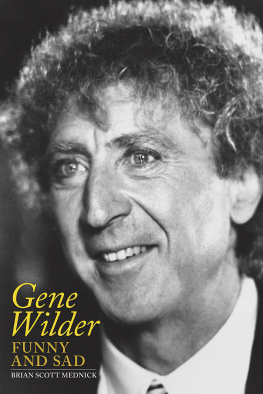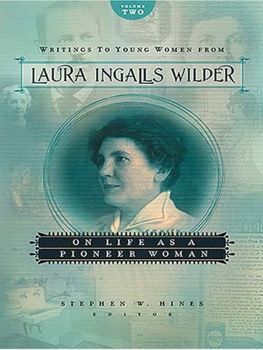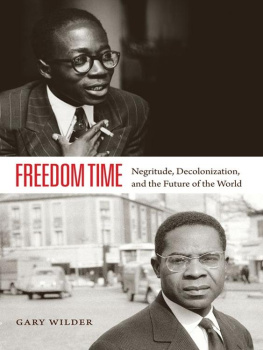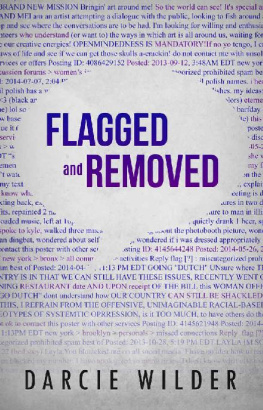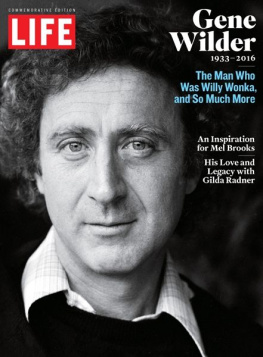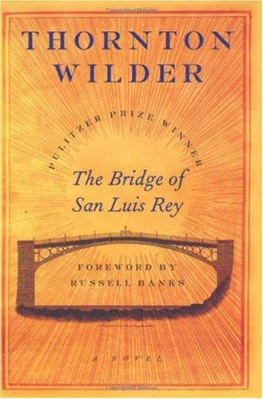Table of Contents
Theres a lot to be said for making people laugh. Did you know thats all some people have?
Joel McCrea as John Lloyd Sullivan in Sullivans Travels (1941)
My friends all told me that my wife was too good for me and after a couple of years I decided they were right.
Gene Wilder as George Caldwell in Silver Streak (1976)
A Career in Bloom
Gene Wilder is a private person and has no qualms about letting anyone, particularly interviewers, know it. I dont mind talking personal, he says, because its the only thing I want to talk about. But I dont like to talk about private. And I wont talk about private. One may naturally ponder what the difference between personal and private is. To find out, all you have to do is ask him a question. If the question is personal, hell be happy to answer it. If its private, thats another story.
Gene doesnt look to get publicity for himself and tends to shy away from Hollywood parties and movie premieres. Hes even antsy about doing publicity for his own movies. When it comes time to sell a film, he said, I dont like to sell because that would make me nervous. But I have an obligation, after a year and a halfs work, to wave a little red flag a week or two weeks before the film comes out, and say, The circus is coming! The circus is coming! Hello, everybody! And then when the circus is playing and everyone knows its there, go home and forget about it till the next time.
While he grants television and print interviews when he has a new film coming out, Gene has largely avoided appearing on the major late night talk shows because they have studio audiences that expect guests to be funny, and Gene doesnt think hes a particularly funny person offscreen. Put me on The Tonight Show or some big show with an audience and I would be very nervous, he told Bob Costas in 1989 on his show Later, which Gene felt comfortable doing since Costas didnt have an audience. I dont mean I couldnt do it, but Id say its not worth it.
Despite the above quote, Gene actually was a guest on The Tonight Show, but only once, on June 12, 1970 to promote Quackser Fortune Has a Cousin in the Bronx . David Steinberg was guest host. Though Gene was still in the early stages of his film career, Steinberg recalled, Gene was already in the stratosphere of comic geniusesa totally original, unique comic entity. Gene never appeared on David Lettermans NBC or CBS programs, and it would be thirty-five years after his Tonight Show appearance before he would go on another comedy talk show when he visited Late Night with Conan OBrien to plug his autobiography in 2005. I hope I didnt do anything to traumatize him, Steinberg joked.
Gene apparently feels more comfortable doing daytime talk shows. In 1978 he and Dom DeLuise were guests on Phil Donahues program to promote The Worlds Greatest Lover . In 1979 Gene appeared on both Merv Griffin and Dinah Shores talk shows, but requested tapings without a studio audience or other guests. To be on with all those other guests, and to know you have to deliver dynamite linesI dont like being funny on shows like that, he said. In movies, Im funny. On TV, Id like to let people know what Im really like. Gene has been a guest on various talk shows in Europe over the years and more recently has appeared on The View and The Martha Stewart Show (on the latter, after Gene discussed his book My French Whore, Stewart showed him several ways to cook asparagus).
Since he is so private, Gene Wilder never spoke at length about his first two marriages until writing about them in his 2005 memoir. Both marriages ended in divorce and produced no children. Gene married Mary Mercier, an actress and playwright, on July 22, 1960. They appeared together in Genes first New York play, Arnold Weskers Roots, in 1961 at the off-Broadway Mayfair Theatre.
Mary was born in Cardiff, Wales. She spent her early childhood in Wales and London before moving to Los Angeles as a teenager. Unhappy with the lack of theater work in L.A., she moved to New York to pursue acting. In 1967 she wrote a Broadway play called Johnny No-Trump, which was a major disaster, closing after five previews and just one opening night performance. Mary stopped writing plays and in the 1970s moved back permanently to Los Angeles where she worked as executive secretary at the Actors Studio West. She had a few small film roles, appearing as one of the passengers in Airplane! (1980) and as waitresses in Mistress, a 1992 comedy that Robert DeNiro co-produced and co-starred in, and Diane Keatons Unstrung Heroes (1995).
Mary is very reluctant to talk about her marriage to Gene, which ended in 1965. When asked to give an interview for this book, she declined, saying the whole subject dredged up some painful, difficult memoriesIts difficult to talk about.
Gene married Mary Jo Ayers, a former college roommate of Corinnes who was several years his senior, on October 27, 1967. Gene had actually met Mary Jo or Jo, as her close friends called her years earlier at a party when he was seventeen and drove down to visit Corinne at the University of Iowa. He found Jo strikingly beautiful but thought she was out of his league because he was an awkward teenager and she was an older college girl. Despite spending most of their time at the party together and even sharing a long kiss, the two would not see each other for another fifteen years, when Corinne would again introduce them.
The couple made their home on the Upper East Side of Manhattan at 110 East 70th Street. Jo had a daughter from a previous marriage named Katie, born on June 4, 1960, whom Gene adopted shortly after marrying Jo. For years, Gene refused to publicly discuss his first two marriages and would only say of Jo, Shes a very nice lady.
According to friends, the pressure of Genes career and being away from home so much contributed to the breakup. Gene also fell in love with another woman while married to Jo, having what he himself described to Newsday s Leo Seligsohn in 1977 as a traumatic affair in Paris in 1968. I fell in love in Paris, Gene told Seligsohn. It was a hopeless situation because I had to leave and did leave after four months. Thirty years later, speaking of the Paris affair, he told Scotland on Sunday s Catherine Deveney, I thought I was in love. We never even made love.
It was Genes choice to end the marriage, and by the time their divorce became final in 1974, Jo had only hurtful feelings towards Gene. This all had a devastating effect on Katie, who never knew her real father and went into therapy as a result of the divorce. Sadly, Gene has been estranged from Katie since the mid-1980s.
Gene and Jo managed to keep their marital woes private to most of those who knew them. When Bud Yorkin, who directed Gene in Start the Revolution Without Me, heard of Genes split from Jo, he was quite surprised. I thought they got along quite well, Yorkin said. I saw him a lot socially after the picture. I saw him in New York. And I remember he told me in his quiet manner and I was really stunned. I saw no evidence of any [trouble].
Before his stage career bloomed in the early 1960s, Gene paid the bills just barely by working as a chauffeur and selling toys at FAO Schwarz. Genes wife Mary and friends such as Charles Grodin were doing similar things to get by. When we werent working, we all walked around and lived on our unemployment checks and ate chuck steak, Gene recalled. I got $35 a week in unemployment and my rent was $100 a month, so I soon ran out of money. I just couldnt manage. I used to allot myself $7.50 a week for incidentals, which meant clothing and doctors and entertainment and car fare and everything else you spend money on to live.
In 1961 Mary had been cast in the off-Broadway play Roots . Gene asked her if she could get him an audition. She did, and director Mark Rydell, who would go on to direct such films as The Rose (1979) and On Golden Pond (1981), cast Gene as Marys husband. One night, Rydells agent, Lily Veidt, widow of German actor Conrad Veidt, came to see the play and afterward asked Gene if he had representation. He told her no. She started representing me, Gene said, and I got a Television Play of the Week: Maxwell Andersons Wingless Victory . Irene Mayer Selznick [who produced A Streetcar Named Desire on Broadway] saw Victory and asked me to try out for The Complaisant Lover, which was about to be done on Broadway starring Michael Redgrave. I tried out and got the part.
Next page
